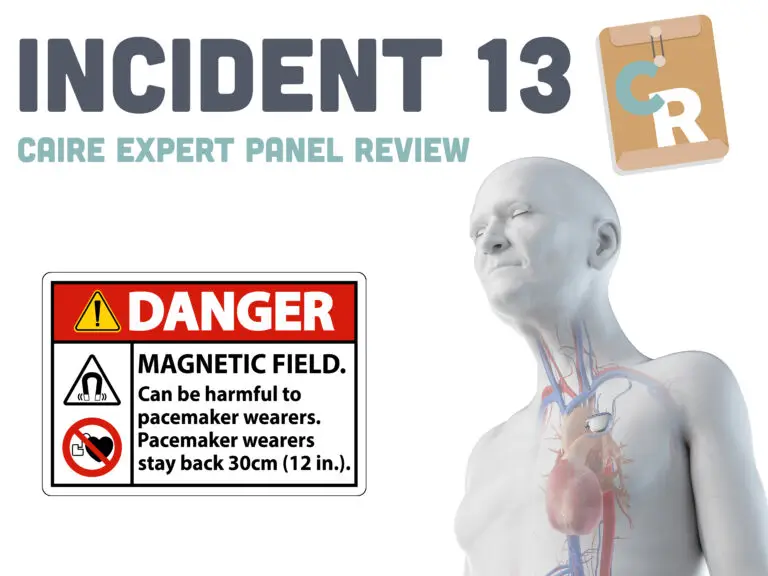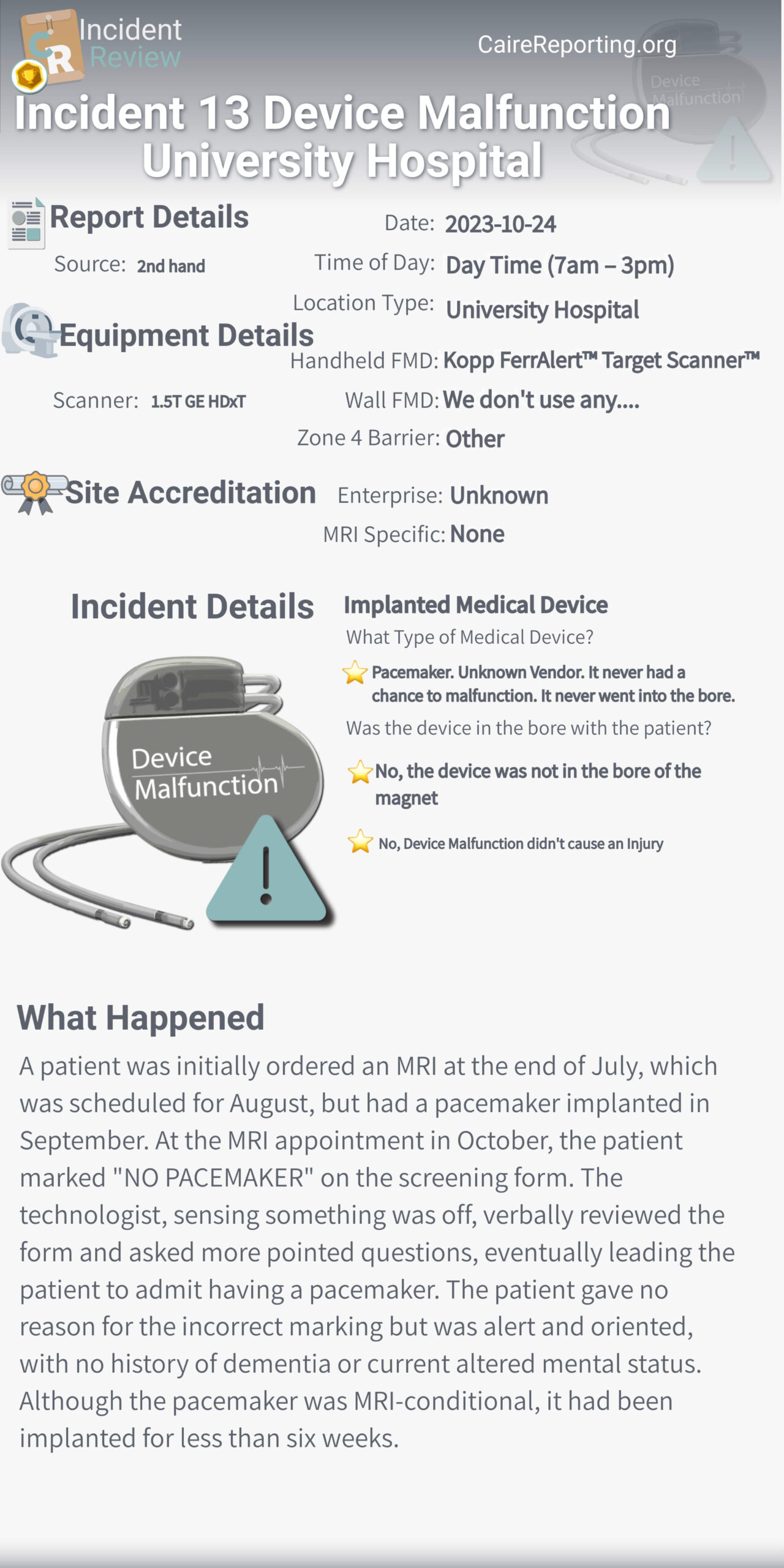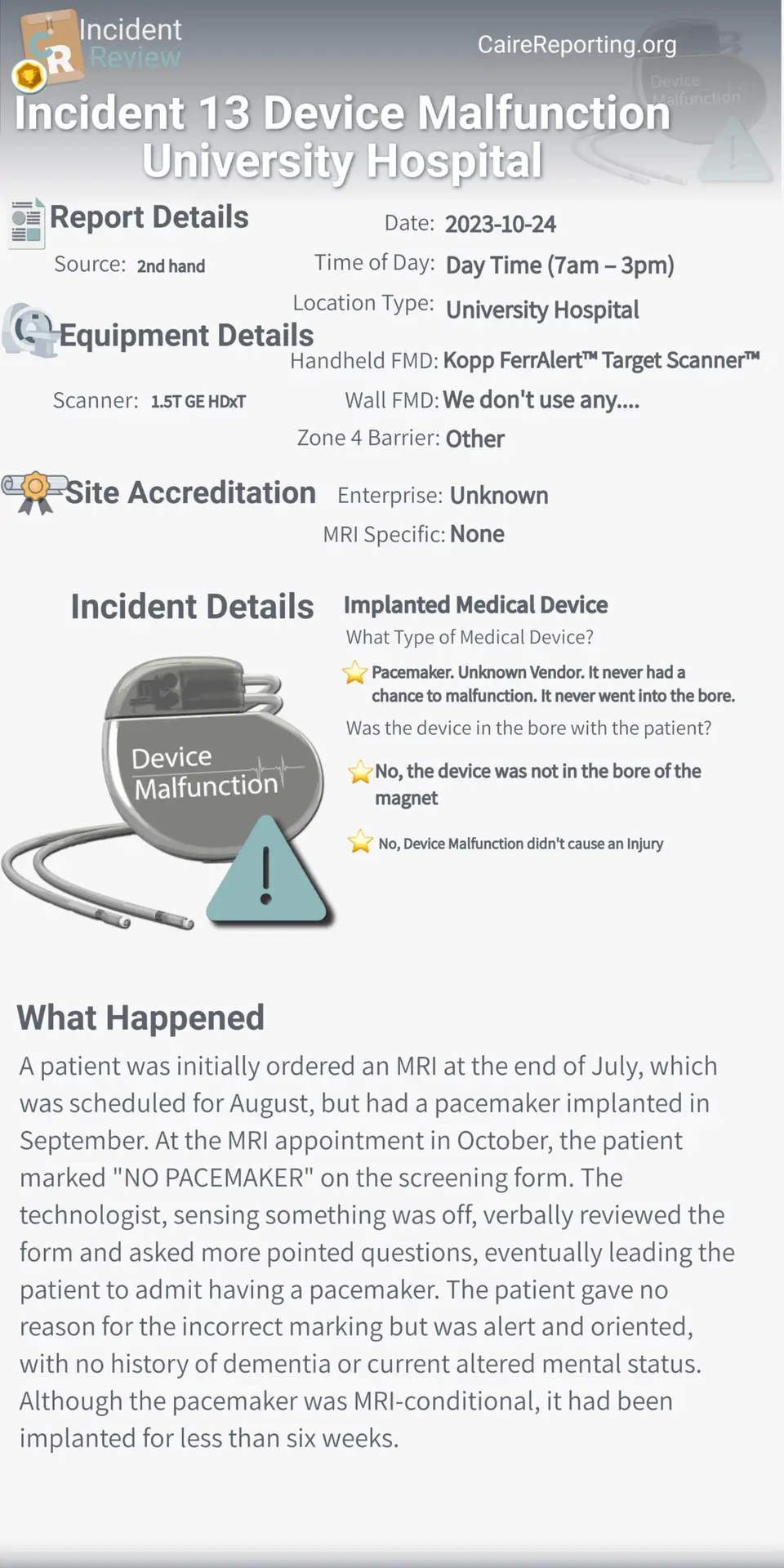

Incident 13 – Undisclosed Pacemaker ‘Good Catch’
Findings of the CAIRE Expert Panel Review
The CAIRE Expert Panel reviewed this incident and had a number of questions about the event. The reporting party was very responsive to follow-up questions and provided additional information, which has allowed the CAIRE Expert Panel to provide observations and recommendations beyond those that could have been identified in the initial report.
The MRI exam was rescheduled and there was a two-month delay between the original exam date and when the exam was performed.
The CAIRE Expert Panel recommends that sites set an ‘expiry’ for pre-appointment MRI screening, after which the screening should be begun again from the start (and not merely modified with ‘has anything changed since…’). The longer the period between a pre-appointment screening (whether provided through the referring physician, or appointment schedulers, or MRI staff) and the executed exam, the more opportunities for events which could introduce complications / contraindications.
The patient initially failed to disclose the presence of a recently implanted pacemaker device at the point-of-care screening on the day of the study.
Universally, the CAIRE Expert Panel commended the MRI staffer who identified the contraindication through vigilant inquiry.
This incident identified a timing / sequence weakness in available electronic information systems, and it is recommended that providers evaluate their MRI patient screening processes and effective use of EMR / electronic information systems when there is a long delay between referral / screening and the date of the executed exam.
Several individuals on the Expert Panel suggested that patients may significantly underestimate the potential risks of implants / devices in the MRI environment, and that patient education about the significance of risks in the MRI environment could be helpful in communicating the essential nature of full and accurate patient disclosure of medical history / possible exam complications.
While the patient failed to disclose the pacemaker in their pre-exam screening form, the device was identified shortly prior to walking the patient into the MRI scanner room.
Several members of the Expert Panel noted that a ferromagnetic detection (FMD) screening, either with the reporter-identified handheld FMD device, or a FMD pre-screener, would likely have identified the presence of the pacemaker, if used appropriately. This example of ‘defense in depth’, in which there are multiple different means of error-identification are deployed, is recognized and appreciated by members of the Expert Panel.
This site had Joint Commission enterprise-level accreditation, the MRI safety standards of which the Expert Panel felt were insufficient to have prompted the discovery of this incident.
While the The Joint Commission (TJC) is one of the accreditation organizations with the greatest number of MRI-specific standards, they are not specific to minimum practices at the point of care. As an example, TJC Diagnostic Imaging standards require the provider ‘manages MRI safety risks,’ but broadly does not identify what those risks are, or what specific practices are effective at managing the risks. TJC also requires MRI technologist training relative to MRI patient screening, but doesn’t identify what an effective screening process includes / excludes.
It is worth noting that none of the other hospital enterprise accreditation organizations, nor any of the MRI modality-specific accreditation organizations, have the level of detail / specificity in their MRI accreditation criteria that the Expert Panel wishes to see. It is also important to note that the absence of accreditation standards for MRI safety is not because of an absence of clearly defined MRI safety practices. TJC, themselves, ‘retired’ their 2008 Sentinel Event Alert on MRI accidents and injuries (SEA #38) in favor of the published guidance on MRI safety practices from the ACR. The ACR publications on MRI safety, including the most recent 2024 ACR Manual on MR Safety, are widely regarded as the world’s leading collection of MRI safety practices.
The following criteria appear to not have played a significant role in this incident:
- The provider type
- The MRI system (field strength, manufacturer, model)
- Ferromagnetic detection systems (though, had staff not caught the device, a FMD could have identified it)
- Zone 4 barrier systems (not present at this site)
Recommendations from the CAIRE Expert Panel:
Sites should review their screening process and institute ‘expiration’ periods for screening forms completed prior to MRI exam dates.
The 2024 ACR Manual on MR Safety does not offer guidance on ‘expiry’ periods for screening information for a specific MR exam. While CAIRE Expert Panel believes that the final screening form completion / review should be conducted immediately prior to the MRI exam, we believe that previously collected pre-screening information should be given an expiry period, perhaps 2 weeks, after which it is not considered valid and ought to be repeated.]
Sites should review the mechanisms by which EMR patient information is made available to MRI services for the identification of potential contraindications.
The 2024 ACR Manual on MR Safety does not offer guidance on access to, or use of, EMR patient information, except for unconscious / unresponsive patients. The CAIRE Expert Panel recommends that individuals conducting MRI patient screenings be provided access to MRI patients’ EMR data that is available from within the provider’s institution. The CAIRE Expert Panel also celebrates the use of automated ‘scraping’ of EMR data for the identification of likely contraindication keywords / key phrases, CPT or ICD10 codes, and population of individual patient EMR files (e.g., in an ’implant tab’) with information on the potential presence of the recorded contraindication.
Providers / Societies should develop and share patient education materials that convey the seriousness of full and accurate disclosure of implants / devices / foreign bodies.
The CAIRE Expert Panel identified a number of ‘patient education’ pieces about MRI that identify the practice of providing information on implants or devices (SoR, UCSF), but none that impress upon the safety importance of full and accurate patient disclosures. We recommend that patient education materials cautiously share with patients the importance of full and accurate disclosure, while being careful to not add to patient anxiety.]
Accreditation organizations (both enterprise and MRI-specific) should make existing defined practices for MRI safety minimum performance criteria under the accreditation standards.
The CAIRE Expert Panel finds that existing enterprise and radiology-specific accreditation standards do not identify MRI screening best practices, nor require their use at accredited providers. We recommend that accreditation organizations modify their MRI-specific standards to identify MRI screening best practices, and require the use of those practices for all entering the controlled access portions of MRI suites (Zones 3 and 4).
Recommendations by:
Place
There are no specific recommendations for the site and the physical environment identified from gaps in safety management from this incident report. The CAIRE Expert Panel does support the use of ferromagnetic detection, as described in the event description, which could have added a layer of defense in depth for this failure mode.
People
The greatest human behavior weakness in this incident report is the misrepresentation / omission on the part of the patient about their clinical history and the recent implantation of a cardiac pacemaker. The CAIRE Expert Panel has recommended the development of MRI patient education materials that provide greater emphasis on the importance of full and accurate medical history disclosure.
Process
The CAIRE Expert Panel has several recommendations regarding process to help reduce the likelihood of similar incidents. Establish an expiry period collected / scraped screening information, after which information will need to be re-collected. Enable available EMR access to MRI point-of-care personnel for clinical history review. Utilize EMR data mining / scraping tools to pre-populate patient records with identified potential contraindications in a uniform, accessible manner. And the CAIRE Expert Panel recommends accreditation organizations review / update MRI-specific accreditation standards to identify more specific, best-practice-informed screening processes as minimum standards.
Quick Links
Resources
- MRI Safety Docs
- CAIRE Manual
- ACR: MRI Safety
- MRI Safety Course
- FDA: MRI Safety


